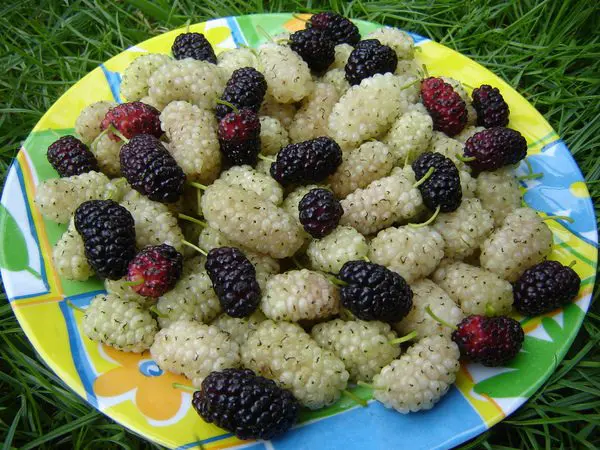Sweet but healthy. Everything you need to know about mulberries and why you should include them in your diet
The beginning of July is the height of the mulberry season, the sweetest, but no less useful berry. We will tell you what is the use of mulberry and what contraindications it has.
Mulberry is a fruit of the mulberry tree, related to figs and breadfruit. Although in Ukraine the tree mostly grows solely for the sake of fruit, in Asia and North America mulberry trees are grown for the sake of leaves, because this is the only food for silkworms.
Mulberries are black, white, and pink, and the berries are often made into wine, fruit juice, tea, jam or canned food, but they can also be dried and used as a natural sweetener or eaten as a snack.
Fresh mulberries are 88% water and contain only 60 calories per glass. In wet weight, they contain 9.8% carbohydrates, 1.7% fiber, 1.4% protein and 0.4% fat. Mulberries are often consumed dried, like raisins. In this form, they contain 70% carbohydrates, 14% fiber, 12% protein and 3% fat, making them quite rich in protein compared to most berries.
Mulberry is rich in many vitamins and minerals, especially vitamin C and iron:
• Vitamin C is an essential vitamin that is important for skin health and various bodily functions
• Iron is an essential mineral with various functions, such as transporting oxygen throughout the body
• Vitamin K1, also known as phylloquinone – important for blood clotting and bone health
• Potassium – a mineral that can lower blood pressure and reduce the risk of heart disease
• Vitamin E – an antioxidant that protects against oxidative damage
Mulberry is also rich in plant compounds such as anthocyanins. However, it should be noted that ripe, rich mulberry is richer in plant compounds and has a higher antioxidant capacity than colorless and unripe berries.
The health benefits of mulberry
1.Reduces cholesterol levels
Cholesterol is an important fatty molecule found in every cell in your body. However, elevated blood cholesterol levels have been linked to an increased risk of heart disease.
Animal studies show that mulberry extracts can reduce excess fat and lower cholesterol levels. They can also improve the ratio between LDL (bad) and HDL (good) cholesterol.
Additionally, some test-tube experiments show that they reduce the formation of fat in the liver, potentially helping to prevent fatty liver disease.
2. Improves blood sugar control
People with diabetes are at risk of a rapid rise in blood sugar levels and need to be careful when eating carbohydrates.
Mulberry contains the compound DNJ, which inhibits an enzyme in the intestines that breaks down carbohydrates. Hence, mulberries may be beneficial for diabetes by slowing the rise in blood sugar after a meal. However, there have been no studies on humans yet and it is too early to talk about 100% of the mulberry work.
In any case, like most berries, mulberry contains very few carbohydrates, even in dry form, and therefore becomes an affordable and safe dessert for people with diabetes.
3. Reduces the risk of cancer
Research has shown that increased stress in the body causes oxidative damage to cells and tissues, which is associated with an increased risk of cancer.
For hundreds of years, mulberry has been part of traditional Chinese medicine as a cancer treatment. Some researchers now believe that these known preventive effects may have a scientific basis.
Animal studies show that the antioxidants in mulberry sap can reduce oxidative stress – potentially lowering the risk of cancer. Keep in mind that the same applies to fruits and vegetables in general. There is no evidence that mulberries reduce cancer risk more than other fruits or berries.
4. Improves digestion
Because mulberries contain dietary fiber, they can help improve digestion by increasing stool volume and making food easier to move through the digestive tract. As a result, they help relieve constipation, bloating, and stomach cramps.
In addition, healthy digestion is a prerequisite for maintaining an optimal weight. Thus, they are great for weight loss programs.
5. Helps the immune system
Mulberry contains alkaloids that help activate macrophages, which in turn stimulate the immune system, keeping it alert to health threats. The vitamin C found in these berries is also an immune-boosting nutrient.
Contraindications and side effects
Mulberry allergies are rare, but mulberry pollen sometimes causes allergic reactions in sensitive individuals. Eating mulberries in moderation is good for your health. But according to a test by the American Diabetes Association, it was found that eating too much mulberry can lower blood sugar levels to dangerously low levels and cause hypoglycemia. …
Mulberry use
Mulberry has a sweet and delicious taste, is rich in nutrients and has a number of potential health benefits that are important for building a healthy diet.
The fruit of this tree is a great ingredient for making delicious smoothies, jams, desserts and snacks. And berries can be eaten raw, and dried and frozen for the winter.
Mulberry is also an effective skin and hair care product. Berries help reduce breakouts and dark spots. Mulberry also promotes hair growth and helps maintain color.







